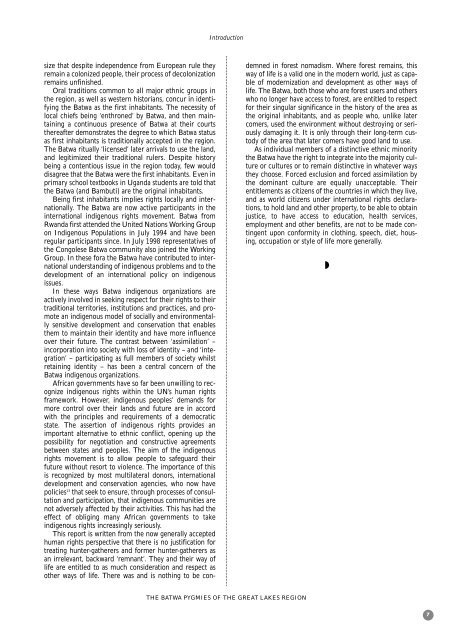The Batwa Pygmies of the Great Lakes Region - UNHCR
The Batwa Pygmies of the Great Lakes Region - UNHCR
The Batwa Pygmies of the Great Lakes Region - UNHCR
Create successful ePaper yourself
Turn your PDF publications into a flip-book with our unique Google optimized e-Paper software.
size that despite independence from European rule <strong>the</strong>y<br />
remain a colonized people, <strong>the</strong>ir process <strong>of</strong> decolonization<br />
remains unfinished.<br />
Oral traditions common to all major ethnic groups in<br />
<strong>the</strong> region, as well as western historians, concur in identifying<br />
<strong>the</strong> <strong>Batwa</strong> as <strong>the</strong> first inhabitants. <strong>The</strong> necessity <strong>of</strong><br />
local chiefs being ‘enthroned’ by <strong>Batwa</strong>, and <strong>the</strong>n maintaining<br />
a continuous presence <strong>of</strong> <strong>Batwa</strong> at <strong>the</strong>ir courts<br />
<strong>the</strong>reafter demonstrates <strong>the</strong> degree to which <strong>Batwa</strong> status<br />
as first inhabitants is traditionally accepted in <strong>the</strong> region.<br />
<strong>The</strong> <strong>Batwa</strong> ritually ‘licensed’ later arrivals to use <strong>the</strong> land,<br />
and legitimized <strong>the</strong>ir traditional rulers. Despite history<br />
being a contentious issue in <strong>the</strong> region today, few would<br />
disagree that <strong>the</strong> <strong>Batwa</strong> were <strong>the</strong> first inhabitants. Even in<br />
primary school textbooks in Uganda students are told that<br />
<strong>the</strong> <strong>Batwa</strong> (and Bambuti) are <strong>the</strong> original inhabitants.<br />
Being first inhabitants implies rights locally and internationally.<br />
<strong>The</strong> <strong>Batwa</strong> are now active participants in <strong>the</strong><br />
international indigenous rights movement. <strong>Batwa</strong> from<br />
Rwanda first attended <strong>the</strong> United Nations Working Group<br />
on Indigenous Populations in July 1994 and have been<br />
regular participants since. In July 1998 representatives <strong>of</strong><br />
<strong>the</strong> Congolese <strong>Batwa</strong> community also joined <strong>the</strong> Working<br />
Group. In <strong>the</strong>se fora <strong>the</strong> <strong>Batwa</strong> have contributed to international<br />
understanding <strong>of</strong> indigenous problems and to <strong>the</strong><br />
development <strong>of</strong> an international policy on indigenous<br />
issues.<br />
In <strong>the</strong>se ways <strong>Batwa</strong> indigenous organizations are<br />
actively involved in seeking respect for <strong>the</strong>ir rights to <strong>the</strong>ir<br />
traditional territories, institutions and practices, and promote<br />
an indigenous model <strong>of</strong> socially and environmentally<br />
sensitive development and conservation that enables<br />
<strong>the</strong>m to maintain <strong>the</strong>ir identity and have more influence<br />
over <strong>the</strong>ir future. <strong>The</strong> contrast between ‘assimilation’ –<br />
incorporation into society with loss <strong>of</strong> identity – and ‘integration’<br />
– participating as full members <strong>of</strong> society whilst<br />
retaining identity – has been a central concern <strong>of</strong> <strong>the</strong><br />
<strong>Batwa</strong> indigenous organizations.<br />
African governments have so far been unwilling to recognize<br />
indigenous rights within <strong>the</strong> UN’s human rights<br />
framework. However, indigenous peoples’ demands for<br />
more control over <strong>the</strong>ir lands and future are in accord<br />
with <strong>the</strong> principles and requirements <strong>of</strong> a democratic<br />
state. <strong>The</strong> assertion <strong>of</strong> indigenous rights provides an<br />
important alternative to ethnic conflict, opening up <strong>the</strong><br />
possibility for negotiation and constructive agreements<br />
between states and peoples. <strong>The</strong> aim <strong>of</strong> <strong>the</strong> indigenous<br />
rights movement is to allow people to safeguard <strong>the</strong>ir<br />
future without resort to violence. <strong>The</strong> importance <strong>of</strong> this<br />
is recognized by most multilateral donors, international<br />
development and conservation agencies, who now have<br />
policies 13 that seek to ensure, through processes <strong>of</strong> consultation<br />
and participation, that indigenous communities are<br />
not adversely affected by <strong>the</strong>ir activities. This has had <strong>the</strong><br />
effect <strong>of</strong> obliging many African governments to take<br />
indigenous rights increasingly seriously.<br />
This report is written from <strong>the</strong> now generally accepted<br />
human rights perspective that <strong>the</strong>re is no justification for<br />
treating hunter-ga<strong>the</strong>rers and former hunter-ga<strong>the</strong>rers as<br />
an irrelevant, backward ‘remnant’. <strong>The</strong>y and <strong>the</strong>ir way <strong>of</strong><br />
life are entitled to as much consideration and respect as<br />
o<strong>the</strong>r ways <strong>of</strong> life. <strong>The</strong>re was and is nothing to be con-<br />
Introduction<br />
THE BATWA PYGMIES OF THE GREAT LAKES REGION<br />
demned in forest nomadism. Where forest remains, this<br />
way <strong>of</strong> life is a valid one in <strong>the</strong> modern world, just as capable<br />
<strong>of</strong> modernization and development as o<strong>the</strong>r ways <strong>of</strong><br />
life. <strong>The</strong> <strong>Batwa</strong>, both those who are forest users and o<strong>the</strong>rs<br />
who no longer have access to forest, are entitled to respect<br />
for <strong>the</strong>ir singular significance in <strong>the</strong> history <strong>of</strong> <strong>the</strong> area as<br />
<strong>the</strong> original inhabitants, and as people who, unlike later<br />
comers, used <strong>the</strong> environment without destroying or seriously<br />
damaging it. It is only through <strong>the</strong>ir long-term custody<br />
<strong>of</strong> <strong>the</strong> area that later comers have good land to use.<br />
As individual members <strong>of</strong> a distinctive ethnic minority<br />
<strong>the</strong> <strong>Batwa</strong> have <strong>the</strong> right to integrate into <strong>the</strong> majority culture<br />
or cultures or to remain distinctive in whatever ways<br />
<strong>the</strong>y choose. Forced exclusion and forced assimilation by<br />
<strong>the</strong> dominant culture are equally unacceptable. <strong>The</strong>ir<br />
entitlements as citizens <strong>of</strong> <strong>the</strong> countries in which <strong>the</strong>y live,<br />
and as world citizens under international rights declarations,<br />
to hold land and o<strong>the</strong>r property, to be able to obtain<br />
justice, to have access to education, health services,<br />
employment and o<strong>the</strong>r benefits, are not to be made contingent<br />
upon conformity in clothing, speech, diet, housing,<br />
occupation or style <strong>of</strong> life more generally.<br />
◗<br />
7

















